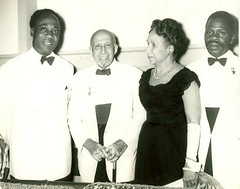
Kwame Nkrumah with WEB Dubois and Shirley Graham Dubois in Ghana at Republic Day ceremony, July 1, 1960.
Originally uploaded by Pan-African News Wire Photo File
Tuesday, July 3, 2007 at 07:36 EDT
ACCRA — Major splits emerged on Monday at a summit of African leaders over how to forge a closer union, with some heads of state urging their peers not to move too fast and focus more on regional integration.
On the second day of an African Union summit in Ghana, heads of state met behind closed doors for a grand debate in which they split over whether to create a United States of Africa or simply upgrade existing institutions.
Libya's Moamer Kadhafi has been leading a push to create a confederation of states, with a union government that would replace the existing AU commission and draw up common foreign and defence policies as well as ease trade barriers.
Other key players on the continent however want the existing structure to be given time to mature, including South African President Thabo Mbeki who hosted the meeting five years ago in Durban when the AU was formally created, and the new Nigerian leader Umaru Yar'Adua.
In his speech, Yar'Adua said that Nigeria supported political and economic integration which would ultimately lead to "the evolvement of the United States of Africa."
But he then argued such a goal could be best reached by first concentrating on regional cooperation.
"Our perspective is mediated by the critical need at his point in our continent's developmental process for the nations of Africa to focus more on the strengthening and consolidation of internal governance and growth structures and on more robust regional integration," said Yar'Adua.
Although Mbeki did not speak, Lesotho Prime Minister Pakalitha Mosisili presented the misgivings of the Southern African Development Community (SADC), a 14-country regional bloc.
"We recognize that Africa's interests would be best served through economic and political integration," he said.
"However we must adopt a bottoms-up approach, not a top-down one. We believe that such integration should be gradual rather than precipitous."
Advocates of stronger unity, including Senegal's President Abdoulaye Wade and Gabon's Ondimba Omar Bongo, however both spoke forcibly for tighter union.
After the debate wrapped up for the night, Wade told reporters there was a split of around 50-50 over whether to fast-track the union or to proceed more gradually.
He refused to rule out linking up with other states to form a breakaway union government in the hope of attracting others at a later stage.
"Everybody agrees with the idea of a United States of Africa but others think economic integration should proceed political integration but political integration will actually accelerate economic integration," said Wade.
The Senegalese leader said many countries had expressed fears of losing their sovereignty but he added: "We have an enormous possibility of making a difference.... All in all, I'm optimistic" of an agreement.
Although the summit is meant to be devoted to the prospects for closer unity, the continent's trouble spots continue to loom large.
The Darfur conflict, which scuppered Khartoum's hopes of assuming the AU presidency at the last summit, also featured high on the opening day as Konare called for a United Nations resolution to nail down a long-promised deployment of a hybrid U.N.-AU force to the western Sudanese region.
Speakers, however, showed little inclination to dwell on the problems of Somalia. No new countries have come forward offering troops to serve in an AU peacekeeping mission in Mogadishu since January's summit in Addis Ababa.
U.N. Deputy Secretary General Asha Rose Migiro said the problems of Somalia should not just be left to Africa.
"African leaders are ready to take a role in addressing the Somalia issue but Somalia is of international concern, it's not an issue for Africa alone," she told reporters.
No comments:
Post a Comment